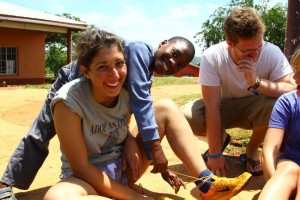Dickinson to Durban » Climate Change » Makaphutu And Lily of the Valley Childrens’ Trusts
Makaphutu And Lily of the Valley Childrens’ Trusts

The final week the MOSIAC group spent in South Africa we stayed at the Koinonia Retreat Center and did some volunteer work for the Makaphutu Children’s Trust. This experience made me reflect many times during the long week after the COP on the privileges I have as well-off, white, female from the United States. While this fact does not cross my mind most days, the days we spent at work in the orphanage and in the nearby villages interacting with the people, really made me think about my privileged status. One moment especially with one of the local people in a village we distributed food to, will forever “get under my skin.”
As our distribution group pulled up in our Hyundai van into a small village located in the Valley of 1,000 Hills, I see what appears to be hundreds of people of the village waiting in front of houses, running down the dirt streets, holding children or talking by the entrance to the distribution center, ominously fenced in and capped with barbed wire. Some are smiling when they see us, some stare at our conspicuous new vehicle as they stroll down the dusty road, turning their heads as they move farther away from us, craning their necks to continue staring. Some children run up to the van and then bounce along down the road again. Then the main distribution truck from the Makaphutu Trust rolls down the road kicking up the prevalent red dry ground, grinding the earth below it’s tires as a warning for the locals to move from the entrance gate. The truck pulls up to the distribution building and before it even has a chance to cut it’s engine, a long and jostling crowd of women has lined up to pull goods out of the back of the van. As we enter the distribution area to begin our work with assisting this insanity, small children’s shoes, bags of maize meal, white bread, canned goods, and shirts are handed out to eager hands. Some women cut the line, trade goods, hide their goods and take more than is allowed—the goal being that everyone walks away with at least one thing. I s
uddenly feel like I’m swimming and am overwhelmed as women in brightly colored dressed shove to grab shoes or food items, speaking in Zulu to the distributors from Makaphutu, while they simultaneously relay in English in short phrases what we should be doing.
This event, lasts for not more than 35, but I feel as if I’ve been stuck in this crowd for hours. Suddenly, I feel a hand slap me on my back once, twice, three times—-I turn around slowly to see an old women’s face, several inches below mine. She is wearing an aqua green dress with bold nay embroidering around the neck. I look into her face as she slowly smiles grabbing my arms which feel like rubber by now, and locks me in a warm, big embrace. “Thanks you. Have a good Christmas” she tells me. I smile, not knowing how to react, but somehow deciding a bewildered smile was acceptable. “Thanks” I manage to say. “You too.” Not knowing what to do, the woman looks at me again and passed away with the moving crowd dispersing back to their homes. I stand for a second, and slowly start to walk back to wear I remember our van is. My legs feel like rubber and I can’t hear the commotion around me. Several young curious faces peer into my own. “Hello” “Hi” “Thank You” I hear again and again. A man grabs my hand and shakes my hand, holding it for a lingering second. I reach the van, unable to think or speak, I crawl inside and collapse.
The simple, but genuine words spoke to me by a stranger that day filled me with an overwhelming and unexplainable combination of emotions that I had never felt before. Was I upset because I was angry at this old woman’s position in society, waiting for a bag of food at her age? Was I greatful and appreciative that I had never experienced this charity before? Was I upset because this woman smiled at me with such caring and genuine kindness because I had given her food for the day? She told me to have a “good christmas”—what was her christmas going to be like?? Had I ever shown that much kindness towards another person for a simple deed? I thought the answer was probably “no.”
So, as the privileged white female from the United States, I was forced to question so many aspects about what I value and cherish that day. While, I can not remove the various labels society has placed on me, I can continue to interact with individuals who possess very different labels than my own and put my life in perspective in this way. My christmas present this year to someone in that women’s position, will be a flock of geese through the organization Heifer International. While I don’t think this is a grand gesture, someone somewhere will.
Filed under: Climate Change








Recent Comments